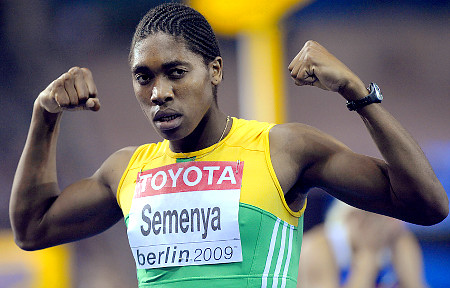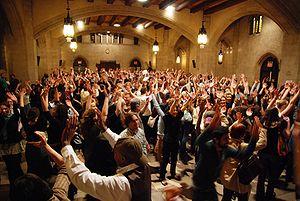Serendip is an independent site partnering with faculty at multiple colleges and universities around the world. Happy exploring!
Precarious, Performative, Playful, Potential ... Perspectives on Sex and Gender
|
|
General Studies 290: The Core Course for the Gender and Sexuality Program |
Precarious < classical Latin precārius given as a favour, depending on the favour or at the pleasure of another, (of property) held by tenancy at will, uncertain, doubtful, suppliant ( < prec-, prex prayer, entreaty + -ārius); exposed to risk, insecure, unstable.
Performance: perform v. + -ance suffix. < Anglo-Norman, French parfournir, ‘to contribute (something) in addition to or as a replacement for (something else)’) to carry out, execute (an action, a promise), to achieve, complete, finish (an action, also a concrete piece of work, e.g. a song, a building, to make, provide (payments, etc.), to act (a play), to supply (what is wanting).
Play, origin uncertain: perhaps cognate with Middle Dutch pleyen to dance, leap for joy, rejoice, be glad
Potential: late 14c., "possible" (as opposed to actual), from L.L. potentialis "potential," from L. potentia "power" (see potent). The noun, meaning "that which is possible," is first attested 1817, from the adj. [Middle English potencial, from Old French potenciel, from Late Latin potentilis, powerful, from Latin potentia, power, from potns, potent-, present participle of posse, to be able; see potent.]
Perspective: <Middle French, French perspective science of refraction, science of optics, art of making mirrors; appearance which various objects have when viewed from a particular vantage point (1635), way in which one projects the future development of a present situation (1676), anticipation of an event in the near future (1688), the foreseeable future (1689), way in which an individual, ideology, or institution conceives or interprets the course of events (1797), the manner in which one imagines an event or the course of a series of events (1836)>; senses relating to light, vision, and visualization; a visible scene; a view or prospect, esp. an extensive one; the true understanding of the relative importance of things; a realistic sense of proportion; a mental view, outlook, or prospect, esp. into the future; an expectation or anticipation.
This “core” course for the program in Gender and Sexuality Studies @ Bryn Mawr and Haverford Colleges is designed as a junior seminar using contemporary feminist and queer scholarship to examine gender and sexuality as marks of social and cultural difference. It is inflected differently each year, depending on the interests of the co-teachers; this semester, it has been designed around Judith Butler's Flexner Lecture series on precarity and performativity, and Karen Barad's lecture on quantum entanglements.
Quantum Entanglement: A New Way to be Married
5 books are available for purchase @ the BMC Bookshop:
- Riki Wilchins' Queer Theory, Gender Theory,
- Eli Clare's Exile and Pride,
- Joan Roughgarden's Evolution's Rainbow (also available free on-line through ebrary),
- Paul Farmer's Pathologies of Power (also available free on-line through ebrary), and
- Chris Cleave's Little Bee.
- All other texts are essays available in our password-protected file.
Prologue: Diffracting our Differences
Week 1 (Tues, Aug. 30)
A wagon wheel, exploring our key terms
Expectations, hopes, our sylla-ship
Lee Knefelkamp. "Listening to Understand." Liberal Education 92, 2 (Spring 2006): 34-35 (in our password-protected file).
AAC&U. "Beyond Limits: Women's Progress in Higher Education--and the World: 1977-2011." Program on the Status and Education of Women. 2011 (in our password-protected file).
Reading together: Riki Wilchins. Chapters 1-3 & 8. Queer Theory, Gender Theory: An Instant Primer. Los Angeles: Alyson Books, 2004.
Introduce yourself on our web forum by describing your reaction to the terms to “precarity," “performativity," "play," "potential" and/or "perspective." Plan to return here each Sunday night to post your ongoing thinking.
Week 2 (Tues, Sept. 6)
Riki Wilchins, Queer Theory, Gender Theory: An Instant Primer. Los Angeles: Alyson Books, 2004.
Mimi Swartz, "Living the Good Lie." New York Times Magazine. June 16, 2011.
Karen Barad, Preface, Acknowledgements and Chapter 2: "Diffractions: Differences, Contingencies, and Entanglements That Matter." Meeting the Universe Halfway: Quantum Physics and the Entanglement of Matter and Meaning, 2007. Durham, N.C.: Duke University Press, ix-xiii, 71-94 (in our password-protected file).

Act I. Dis/Ability and Intra-Action
Week 3 (Tues, Sept. 13)
Eli Clare, Exile and Pride: Disability, Queerness, and Liberation. Cambridge: South End Press, 1999.
Cripping Sex and Gender. June 2010.
Week 4 (Tues, Sept. 20)
Ray McDermott and Hervé Varenne, Culture as Disability. Anthropology and Education Quarterly 26 (1995): 323-348.
Hervé Varenne, Extra burdens in the search for new openings: on the inevitability of cultural disabilities (2003).
Paul Grobstein, Cultures of Ability. February 15, 2010.
Schedule a conference with your writing instructor this week (each of us
will be mentoring 1/2 of the class for the first two papers; then we'll switch).
Week 5 (Tues, Sept. 27)
Margaret Price, Forward, Introduction and Chapter 1: "Listening to the Subject of Mental Disability: Intersections of Academic and Medical Discourses." Mad at School: Rhetorics of Mental Disability and Academic Life. Ann Arbor: University of Michigan Press, 2011. xi-57 (in our password-protected file).
Lawrence D. Rosenblum, Chapter 1, "The Sounds of Silence," and Chapter 10, "See What I'm Saying." See What I’m Saying. The Extraordinary Powers of our Five Senses. New York, London: Norton, 2010. 1-27, 238-265, 297-298, 322-325 (in our password-protected file).
8 p.m. Sun, Oct. 2, web event #1 (4 pp.) due: exploring your current understanding of en-abling the intra-action of gender, sexuality, and disability (or ....?). See instructions for preparing and posting web papers, as well as inspiration for going beyond them....
 |
 |
Act II. De/Meaning Sex and Gender
Week 6 (Tues, Oct. 4)
Joan Roughgarden. Introduction, Chapter 1: “Sex and Diversity," Chapter 2: “Sex vs Gender,” Chapter 3: “Sex within Bodies,” Chapter 4: “Sex Roles," and Chapter 8: “Same Sex Sexuality." Evolution's Rainbow: Diversity, Gender, and Sexuality in Nature and People. Berkeley: University of California Press, 2004 (available for purchase in BMC Bookshop or free on-line through ebrary).
Olivia Judson. Chapter 12: “Eve’s Testicle.” Dr. Tatiana’s Sex Advice to All Creation. New York: Metropolitan Books, 2002: 187-211, 256-8 (in our password-protected file).
John Alcock. "Changing priorities in changing social environments." Animal Behavior, An Evolutionary Approach, 9th ed. Sunderland, MA: Sinauer Associates, 2009, 168-181 (in our password-protected file).
What Females Want and What Males Will Do. Nature.
DVD; April 5, 2008--on reserve; also available on-line @
http://www.pbs.org/wnet/nature/episodes/what-females-want/video-full-episode/5371/
http://www.pbs.org/wnet/nature/episodes/what-males-will-do/video-full-episode/5374/
Subtract about 3' from the time listings to find the correct start for the on-line video clips: Part I: barn swallows, female choice, monogamy, testosterone (start at 15’; end at 22’); gelada primates, “handicap principle” (start at 30.49’; end at 32.59’); testosterone (start at 48.45’; end at 51.55’). Part II: duck phallus/oviduct, “cryptic choice”, defense against forced copulation (start 40.49’; end 44.49’)--
FALL BREAK (Oct. 11)
Week 7 (Tues, Oct. 18)
Andrew Sullivan. The He Hormone. New York Times Magazine. Apr 2, 2000.
Paola Sapienza, Luigi Zingales and Dario Maestripieri. Gender differences in financial risk aversion and career choices are affected by testosterone. Proceedings of the National Academy of Sciences 106, 36 (2009): 15268-15273 (in our password-protected file).
Daphna Joel and Ricardo Tarrasch. The risk of a wrong conclusion: On testosterone and gender differences in risk aversion and career choices. Proceedings of the National Academy of Sciences 107, 5 (2010): E19 (in our password-protected file).
Paola Sapienza, Luigi Zingales and Dario Maestripieri. Reply to Joel and Tarrasch: On the relationship between testosterone, gender, financial risk aversion, and career choices. Proceedings of the National Academy of Sciences 107, 5 (2010): E20 (in our password-protected file).
Peter A. Bos, David Terburg, and Jack van Honk. Testosterone decreases trust in socially naïve humans. Proceedings of the Natlonal Academy of Sciences 107, 22 (2010): 9991-9995 (in our password-protected file).
Joan Roughgarden. Chapter 16: "Disease and Diversity." Evolution’s Rainbow: Diversity, Gender, and Sexuality in Nature and People. Berkeley: University of California Press, 2004. 280-305
Shedding Light on Intersex. The Oprah Winfrey Show. September 21, 2007.
Welcome to Parents. Handbook for Parents. DSD Guidelines. Consortium on the Management of Disorders of Sex Development. Intersex Society of North America. March 25, 2006.
Erik Parens. “Thinking about Surgically Shaping Children.” Surgically Shaping Children: Technology, Ethics, and the Pursuit of Normality. Johns Hopkins, 2006. xiii-xxx (in our password-protected file).
Week 8 (Tues, Oct. 25)
Rebecca Jordan-Young. Preface, Chapter 1: "Sexual Brains and Body Politics" and Chapter 10: "Trading Essence for Potential." Brain Storm: The flaws in the Science of Sex Differences. Harvard University Press, 2010. ix-20, 269-292.
Bonnie Spanier and Jessica Horowitz. "Looking for Difference? Methodology Is in the Eye of the Beholder." Gender and the Science of Difference: Cultural Politics of Contemporary Science and Medicine. Ed. Jill Fisher. New Brunswick: Rutgers University Press, 2011. 43-62.
8 p.m. Sun, Oct. 30, web event #2 (4 pp.) due: aiming for a specific audience (of middle or high school students? readers of the Bi-College News, the Philadelphia Inquirer, a sex ed blog site??), explain what's important about some dimension of the biology of gender or sexuality. See instructions for preparing and posting web papers, as well as inspiration for going beyond them....

"The photo on our front cover and back covers [of the Bryn Mawr Alumnae Bulletin (November 2005)] shows students at The Bryn Mawr Summer School for Women Workers in Industry performing a skit, "Wealth and Poverty," in 1930. Opened in 1921, the School offered scholarships for programs in political economy, science and literature to factory workers until 1938. The first of its kind, it was the vision of President of the College M. Carey Thomas, who recognized the importance of women's roles in Progressive-era social reform."
Act III. Relationships, Left and Right
Week 9 (Tues, Nov. 1)
Therese Hesketh and Zhu Wei Xing. Abnormal sex ratios in human populations: Causes and consequences. Proceedings of the National Academy of Sciences 103, 36 (2006): 13271-13275 (in our password-protected file).
Christophe Z. Guilmoto. "The sex ratio transition in Asia." Population and Development Review 35, 3 (2009): 510-549 (in our password-protected file).
Generations Ahead, National Asian Pacific American Women’s Forum, Asian Communities for Reproductive Justice. Taking a Stand: Tools for Action on Sex Selection. 2010. 32 pp.(in our password-protected file).
Center for Genetics and Society. Sex Selection.
Sunita Puri, "I know it's a girl, and I need your help to get it out of me." Slate. August 2, 2011.
Abortion Conspiracy Part 1: The Billboard Campaign (15’).
Abortion Conspiracy Part 4: Racial Uplift (13.25’).
Ruth Padawer. "The Two-Minus-One Pregancy." The New York Times Magazine. August 10, 2011.
Mon, Nov. 7 Judith Butler’s First Flexner Lecture:
Gender and its Allies: Performativity in Precarity. McPherson Auditorium, Goodhart Hall, 7-9 p.m.
Week 10 (Tues, Nov. 8)
Karen Barad. "Quantum Entanglements and Hauntological Relations of Inheritance: Dis/continuities, SpaceTime Enfoldings, and Justice-to-Come." Derrida Today 3, 2 (2010): 240-268.
Karen Barad gives a public lecture in our class, sponsored by the Greater Philadelphia Women's Studies Consortium.
Mon, Nov. 14 Judith Butler’s Second Flexner Lecture:
Gender and its Allies: Performativity in Precarity. McPherson Auditorium, Goodhart Hall, 7-9 p.m.
Week 11 (Tues, Nov. 15)
Sharon Welch, “The Ethic of Control,” “Celebrating Limits, Contingency, and Ambiguity” and “The Joy of Communal Resistance.” A Feminist Ethic of Risk. Revised Edition. Minneapolis: Fortress Press, 2000. 13-37, 158-172 (in our password-protected file)..
Judith Butler, Chapter 2: “Violence, Mourning, Politics.” Precarious Life: The Powers of Mourning and Violence. New York: Verso, 2004. 19-49 (in our password-protected file).
John Humbach, Towards a Natural Justice of Right Relationships. From Human Rights in Philosophy and Practice, Burton M. Leiser and Tom D. Campbell, eds., 2001. 1-18 (also in our password-protected file).
Mon, Nov. 21 Judith Butler’s Third Flexner Lecture:
Gender and its Allies: Performativity in Precarity. McPherson Auditorium, Goodhart Hall, 7-9 p.m.
Week 12 (Tues, Nov. 22)
Paul Farmer, Pathologies of Power: Health, Human Rights, and the New War on the Poor. Forward by Amartya Sen. Introduction, Chapter 1: "On Suffering and Structural Violence; Social and Economic Rights in the Global Era," and Chapter 5: "Health, Healing and Social Justice." Berkeley: University of California Press, 2003. xi-50, 139-159 (available free on-line through ebrary).
United Nations. Progress of the World’s Women/In Pursuit of Justice. 2011. 168 pp.
Ricardo Hausmann, Laura D. Tyson, Saadia Zahidi. The Global Gender Gap Report. World Economic Forum. 2010 (in our password-protected file).
THANKSGIVING BREAK
Week 13 (Tues, Nov. 29)
Chris Cleave, Little Bee. New York: Simon and Schuster, 2009. 288 pp.
Workshop on Theater of the Oppressed
8 p.m. Sun, Dec. 4, web Event #3 (4 pp.) due: explore the possibility of building some sort of "right relationship" w/ reference to a concrete contemporary problem that interests you (this could be a
new relationship between theory and action, or what Butler calls a "queer alliance" among unaffliated identity groups, or....?) For suggestions, check out Allies for Change and a campaign to lift abortion restrictions on US humanitarian aid (you can find the brief prepared by the Global Justice Center about this issue in our password-protected file). See also instructions for preparing and posting web papers, as well as inspiration for going beyond them....

Theater of the Oppressed
Epilogue: Moving On-and-Out From Here
Week 14 (Tues, Dec. 6)
Final Performances of Precarity, Play, Potential, Perspective....
drawing inspiration, perhaps, from
Theater of the Oppressed and Theater of Witness
Schedule a conference with your writing instructor this week
(the one of us you didn't meet with in September!).
12:30 p.m., Fri, Dec. 16: Final Web Event (12 pp, expanding on one of your earlier projects) due in your final e-portfolio.
See instructions for preparing and posting web papers, as well as inspiration for going beyond them....
[Some Reading and Prepping Notes]


